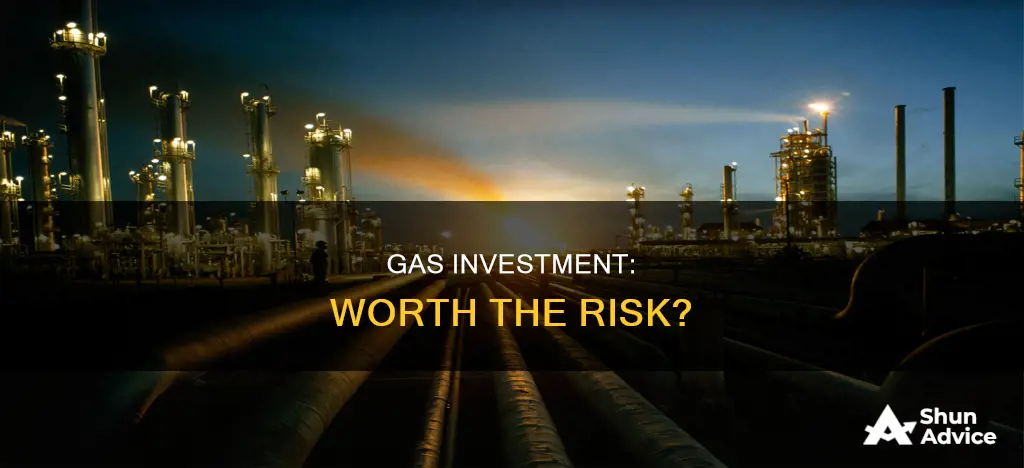
Investing in gas and oil is risky due to the volatility of the market. The industry has experienced significant ups and downs over the past few years, and while it can produce significant capital gains, it is difficult to time the market right. Oil and gas stocks tend to be more volatile than the broader market as they are sensitive to changes in supply and demand. Additionally, there are other risks associated with investing in this sector, such as dividend cuts and accidents like oil spills. However, some people may still be tempted to invest in gas and oil due to the potential for high profits.
| Characteristics | Values |
|---|---|
| Volatility | Oil and gas stocks are more volatile than the broader market. |
| Dividends | Dividends are attractive to investors but carry the risk of being cut if the company is unable to fund the payments. |
| Environmental concerns | Fossil fuels emit greenhouse gases, so governments are increasingly pressuring companies to decarbonize their operations. |
| Safety concerns | Oil and gas are flammable and toxic, and the machinery that extracts them is heavy and complex, so a misstep can have tragic consequences. |
| Market timing | It's impossible to time the market, but wise oil and gas investments could help you make a significant profit. |
What You'll Learn

The pros and cons of investing in gas and oil stocks
The oil and gas industry has experienced significant market volatility in recent years, leaving energy investors wondering whether oil companies are smart investments. While some of the biggest companies in the world are oil and gas producers, investing in this industry carries a number of significant risks.
The pros
Oil and gas stocks can produce significant capital gains from share price appreciation and attractive dividend income during periods of high oil and gas prices. As crude oil prices rise, oil companies tend to generate more cash, giving them more money to drill additional wells to increase their oil and gas production, repay debt, repurchase stock, and pay dividends, all of which can create value for shareholders. Dividend payments in the sector tend to be higher than average because of the amount of cash that oil companies can generate during good times. That often makes the sector attractive to investors seeking high dividend yields.
Oil is also sometimes seen as a portfolio diversifier and a hedge against inflation. The demand for oil is expected to increase as emerging market economies continue to industrialize, regardless of price.
The cons
The main risk associated with oil and gas investments is price volatility. Oil and gas stocks tend to be more volatile than the broader market as they are sensitive to changes in the supply and demand of the underlying commodities. When prices are low, the market tends to punish these stocks.
There is also a significant risk that the dividend can be cut if the company is unable to earn enough revenue to fund the payments to investors. This risk is intertwined with that of low commodity prices. If companies earn less revenue from the sales of their products, they are less likely to fund regular dividend payments.
Another risk in the oil and gas sector is that an accident could occur, such as an oil spill. This type of accident can be devastating and cause a company’s share price to plummet.
Oil and gas exploration is also unpredictable. A company may buy the rights to an exploration block and conduct tests to determine the presence of oil or gas deposits. If they're found, the company must drill test wells to determine the quality of the deposits and then drill production wells and connect the associated infrastructure, all before earning any money. The inherent uncertainty of exploration can result in large losses from investments that don't pan out.
Finally, fossil fuels emit greenhouse gases during their production, transportation, and combustion, which contribute to climate change. As a result, governments are increasingly pressuring companies to decarbonize their operations, and demand for oil and gas will likely wane in the coming decades.
Stable Interest Rates: Investors' Confidence Boost?
You may want to see also

The risks of investing in the oil and gas sector
Market Price Volatility
The prices of oil stocks are volatile, making it risky for investors to tie up a large percentage of their resources without adequate research. Price volatility in oil company stocks depends on a number of geographical, political, and economic factors. For example, political instability in the Middle East has had a significant impact on oil stock prices.
Political Risk and Instability
Political risk is a major factor for oil companies, especially when they are working in unstable territories. Oil companies prefer to invest in stable countries, but they will go where the oil and gas is. A sudden political shift or change in government policy can have a significant impact on projects.
Geological Risk
The extraction of oil and gas is difficult due to the terrain and the possibility that the predicted size of the reserves was incorrect. This is known as geological risk and it can affect the profitability of a project.
Oil Spill and Fire Accidents
Oil spills and fire accidents on exploration sites can lead to crashes in stock prices. For example, the Deepwater Horizon oil spill in the Gulf of Mexico in 2010 led to BP stock prices plunging and investors suffering huge losses.
Environmental Issues
Fossil fuels emit greenhouse gases during their production, transportation, and combustion, which contribute to climate change. Governments are increasingly pressuring companies to decarbonize their operations, and demand for oil and gas will likely decrease in the coming decades.
Safety Concerns
Oil and gas are flammable and toxic, and the pipelines transporting them can stretch for thousands of miles. The machinery used to extract oil and gas is heavy and complex. A misstep can have tragic consequences, as seen in the Deepwater Horizon disaster.
Markets: The Freeze
You may want to see also

The impact of rising oil prices on investment portfolios
Rising oil prices can have a significant impact on investment portfolios, and there are several factors to consider when examining this relationship. Firstly, the oil and gas industry is known for its market volatility, with investors experiencing booms and busts due to the cyclical nature of the business. This volatility is influenced by various factors beyond the control of oil and gas companies, such as geopolitical tensions, supply and demand dynamics, and economic growth or slowdowns.
Impact on Stock Prices
One of the main ways rising oil prices can affect investment portfolios is through stock prices. While there is debate about the strength of the correlation, many believe that higher oil prices lead to higher costs for businesses and consumers, which can negatively impact stock prices. This is particularly true for transportation companies, as fuel is a significant input cost. Additionally, higher oil prices can contribute to inflation, further impacting the purchasing power of consumers and businesses.
Volatility and Risk
The oil and gas sector tends to be more volatile than the broader market due to its sensitivity to changes in the supply and demand of oil and gas. This volatility can be a risk for investors, as it can lead to unpredictable stock price movements. Oil companies also face the risk of accidents, such as oil spills, which can have devastating consequences for the environment and the company's share price.
Benefits of Rising Oil Prices
However, rising oil prices can also present opportunities for investors. Oil and gas stocks can produce significant capital gains during periods of high oil and gas prices. Additionally, dividend income can be attractive during these periods as oil companies tend to generate higher cash flows.
Diversification and Hedging
Investing in the oil and gas sector can also serve as a portfolio diversifier and inflation hedge. The sector is attractive to both day traders and long-term investors due to its active and liquid market nature.
Timing and Caution
Timing is crucial when investing in oil and gas. While wise investments during low price periods can lead to significant profits, investing during high price periods may leave little room for gains and potentially expose investors to losses. Therefore, investors should exercise caution and carefully consider their risk tolerance and investment goals before adding oil and gas stocks to their portfolios.
Starbucks: Worth Your Investment?
You may want to see also

The best oil and gas stocks to invest in
Exxon Mobil (XOM)
Exxon Mobil is one of the world's largest publicly traded international oil and gas companies, with a robust global footprint. The company operates across diverse energy-related endeavours, including upstream exploration, production, refining, and distribution. Exxon Mobil is committed to technological innovation and has a history of enhancing energy efficiency and sustainability. With its significant presence in upstream and downstream activities, the company plays a pivotal role in shaping the global energy landscape. Its commitment to sustainability and environmental stewardship, along with its strong financial profile, makes it an attractive investment option.
Pioneer Natural Resources (PXD)
Pioneer Natural Resources is a prominent independent oil and gas exploration and production firm headquartered in the United States. The company primarily operates in the Permian Basin, one of the world's largest oil reserves. Pioneer's strategic emphasis on horizontal drilling, effective resource management, and sustainable environmental practices has solidified its standing in the industry. While it faces challenges such as commodity price fluctuations and environmental concerns, its track record of efficient operations and resource management makes it an attractive investment option for those eying the energy sector.
Canadian Natural Resources Limited (CNQ)
Canadian Natural Resources Limited is a Canadian-based energy exploration and production company, ranking among the nation's largest independent producers of crude oil and natural gas. CNQ boasts a diversified portfolio, including conventional and unconventional oil and gas assets, with operations spanning Western Canada, the North Sea, and Offshore Africa. The company is renowned for its commitment to innovation, cost-effective practices, and environmental sustainability. Its efficient operational strategies and dedication to technological advancements make it a standout energy stock for investors cautiously navigating market fluctuations and industry challenges.
Halliburton (HAL)
Halliburton is a leading global provider of products and services to the energy industry, serving customers in more than 80 countries. The company offers a diverse portfolio, including drilling services, well construction, hydraulic fracturing, and reservoir characterization. Halliburton's expertise, global presence, and strong customer base make it a preferred partner for energy companies. Its focus on technology and innovation, particularly in the areas of advanced drilling and digital solutions, sets it apart in the industry. The company's commitment to sustainability and environmental stewardship further enhances its attractiveness as an investment option.
Valero Energy (VLO)
Valero Energy is a leading international manufacturer and marketer of transportation fuels and petrochemical products. With headquarters in San Antonio, Texas, Valero operates 15 refineries across the United States, Canada, and the United Kingdom, making it one of the largest independent refiners in the world. Valero's diverse product portfolio includes gasoline, diesel, jet fuel, asphalt, petrochemicals, and renewable diesel. The company's robust refining capabilities, strategic geographic footprint, commitment to operational excellence, and focus on shareholder returns make it a compelling investment option in the oil and gas sector.
Other Notable Mentions:
- Chevron (CVX)
- Williams Cos. Inc. (WMB)
- Energy Transfer LP (ET)
- TotalEnergies SE (TTE)
- Devon Energy
- HF Sinclair
- TC Energy
Retirement Strategies of the Rich
You may want to see also

The volatility of the oil and gas sector
The oil and gas sector is a volatile market, with prices fluctuating in response to various factors such as supply and demand, economic conditions, and geopolitical events. This volatility has a significant impact on the performance of companies in the industry and the returns on investments.
Supply and Demand
The law of supply and demand plays a crucial role in the volatility of oil and gas prices. When demand for oil and gas increases, prices tend to rise as well. This can be influenced by various factors, including population growth, economic growth, and seasonal variations, such as increased demand for natural gas during the winter. Conversely, when demand decreases, prices tend to fall. For example, during the COVID-19 pandemic, lockdowns and travel restrictions led to a sharp drop in demand for oil, causing prices to plummet.
Economic Conditions
The state of the global economy also plays a significant role in the volatility of oil and gas prices. During economic booms, demand for oil and gas tends to increase as businesses and consumers use more energy. This can drive up prices. Conversely, during economic downturns or recessions, demand may decrease, leading to lower prices. For instance, during the 2008-2009 financial crisis, oil prices experienced significant volatility, with large price increases followed by sharp declines.
Geopolitical Events
Geopolitical events and decisions by oil-producing countries can also impact the volatility of oil and gas prices. For example, in March 2020, Saudi Arabia and Russia engaged in an oil price war, causing global oil prices to plummet. Similarly, the suspension of agreed production cuts among the Organization of the Petroleum Exporting Countries (OPEC) and its partners in 2020 led to a sudden increase in crude oil supply, causing prices to fall. On the other hand, the Russian invasion of Ukraine in 2022 caused energy prices to soar.
Market Volatility
The oil and gas sector is also influenced by broader market volatility. The stock prices of companies in this sector tend to be more volatile than the broader market, as they are sensitive to changes in the supply and demand of the underlying commodities. This means that investors in oil and gas stocks may experience greater price fluctuations compared to other sectors.
Accidents and Environmental Concerns
Finally, the oil and gas sector is susceptible to accidents, such as oil spills, which can have devastating environmental consequences and significantly impact a company's share price. For example, the Deepwater Horizon oil spill in 2010 caused BP's stock to drop by over 55%. Additionally, as governments and consumers increasingly prioritize decarbonization and clean energy sources, the long-term demand for oil and gas may wane, impacting the sector's volatility.
In summary, the oil and gas sector is subject to significant volatility due to various factors, including supply and demand dynamics, economic conditions, geopolitical events, market fluctuations, and unexpected events such as accidents. This volatility can create both risks and opportunities for investors, underscoring the importance of careful consideration and a comprehensive understanding of the market before investing.
College: A Risky Bet?
You may want to see also
Frequently asked questions
Investing in gas can be risky due to market volatility, unpredictable exploration, environmental issues, and safety concerns. However, it can also offer significant capital gains and attractive dividend income during periods of high gas prices.
The main risks include price volatility, the possibility of dividend cuts, and the potential for accidents, such as oil spills, which can cause a significant decline in a company's share price.
The price of gas is influenced by supply and demand dynamics, geopolitical events, and the actions of organizations like OPEC. For example, the Russia-Ukraine crisis and the consideration of banning Russian oil imports led to concerns over supply and rising gas prices.
Rising gas prices can impact your investment portfolio in various ways. They can trigger fears of a global recession and affect central bank decisions on interest rates. High gas prices can also lead to "demand destruction," where consumers reduce their gas usage, potentially lowering prices.
If you have a well-diversified portfolio, it is generally advisable to remain cautious and avoid making impulsive changes. While energy stocks may seem attractive, they can also become expensive, and it is challenging to time the market accurately.







